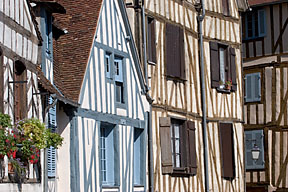You will find here a selection of tips and tricks for the beginner in photography: by order of priority, those that I find crucial for rapid progress.
You're generally better off without centering (your subject, the horizon), except to highlight a symmetrical view. It is often recommended to stay approximately aligned with imaginary lines that divide your image in thirds (for the horizon or a wall), and to put the main subject at their intersections.
Roll your mouse over the picture to reveal those lines.
Beware, the eye is very critical against small horizontality or verticality discrepancies around the subject and compared to the borders of the image. At worst, such a bad framing can generally be corrected in post-processing.
A key to a powerful image is a subject that has one or more contrasts with the rest of the image; for instance:
complementary colors, saturated/pastel, light/shade, sharp/blurred, dot/line, large/small, few/many, straight/bended, vertical/horizontal, circular/diagonal, area/line, smooth/coarse, mobile/still, light/heavy, transparent/opaque, liquid/solid, strong/weak, rich/poor, etc.
Roll your mouse over the picture to reveal the real subject which was concealed for the sake of demonstration.
Without going as far as
minimalism, it is good practice to reduce distractions in your compositions by moving closer, concentrating on atmosphere and leads to your subject.
For this devilish knocker, I believe I found a good compromise between a detailed close-up and a picture of the whole door. Following the lines from left to right will carry us with the devil deep down the earth...
For a portrait,
as zooming does not change perspective at all, relative proportions of the different parts of the face will only be determined by the shooting distance. If it is short, the nose being closer to the lens will be rendered bigger than the ears. The side image was shot at about 3 m (10 feet); this human sized statue is very nicely proportionned. Roll your mouse for the same picture taken at arms length
selfie distance.
As a rule of thumb, unless the subject has a very small nose like a child, avoid shooting adults at less than about 2 m (6 feet) to maintain well balanced face lines.
It is well known that the early morning will give you the most beautiful lights. Nevertheless, when the sun is at its highest and the shadows too contrasted, it is still possible to make some good shots:
- prefer evenly lit semi-detail,
- fill-in flash can help wash out nearby shadows (portraits for instance),
- use RAW file format to keep as much dynamic range as possible for post-processing,
- the polarizing filter can also help reduce bright 90° reflections; in this case, you will need to slightly warm up the color temperature under Photoshop.
This evenly lit semi-detail image was taken around noon. Rolling your mouse over it will reveal a softened version (Camera RAW).
In back lit or straight side lit situations (cloudless sky for instance),
fill-flash will wash out those harsh shadows on your forefront subject. Fill-flash is active in
aperture priority (Av) and
shutter-speed priority (Tv) modes. Exposure settings are then as usual and the flash will slightly light up the forefront subject (about -1 EV), just enough to soften shadows. Flash exposure compensation will let you adjust the desired shadow level.
In bright scenes, the flash in high-speed sync mode will allow a wider aperture if necessary.
Roll your mouse over this image taken in Av mode to trigger fill flash.




